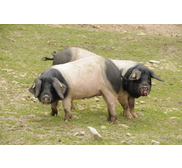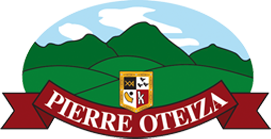The Basque pig

Also called “Pie Noir”, the Basque pig is a breed of Iberic pig and is one of the 6 acknowledged local races along with the Gascon, the Limousin, the Corse, the Western White, and the Bayeux.
The Basque pig originally comes from the Basque country, Bearn and Hautes Pyrénées regions of South West France.
Nearly extinct and declared as an endangered species in 1981 by the Ministry of Agriculture , the Basque pig has survived thanks to the perseverance and commitment of a handful of local breeders.
The Basque pig in mountainside:
The Basque pig can be distinguished by its black and white bicolored skin, its black head and hind legs and its long ears crossed at the muzzle.

The pigs roam free, in the forest, in the mountainside. They take shelter in wooden cabins made with fern roofs.
The pigs mainly feed on herbs and seasonal fruits like chestnuts, acorns, beechnuts (from September to the first snow) and on a food supplement of –GM free cereals given daily by the breeders to preserve its food balance.
Breeding steps:
From birth to 2 months:
The pigs are raised in fern huts and suckle until they reach 2 months. A piglet weights around 20kg.
From 2 to 14 months:
Once vaccinated, identified and tattooed, pigs then live on the mountainside within enclosures of more than a hectare (never more than 40 animals per enclosure).
The pig is tattooed on his gammons and loins, a double guarantee of traceability of the finished product.
The ring is placed on the pig muzzle in order to avoid it damaging the mountain plots.
From 12 to 14 months:
At a mature age, the pig weights between 140 and 160kg.
Some figures regarding the breeding activity of the Basque pig:
1981: Notification as an endangered species and rescue plan established by theMinistry of Agriculture in collaboration with INRA (Institut National de la Recherche Agronomique): there are only 25 sows and 2 boars remaining in France.
1988: Pierre Oteiza (re)discovers the Basque pig during the Salon International de l’Agriculture in Paris.
1990: Foundation of the association « le Porc Basque en Vallée des Aldudes », which gathers 10 breeders.
1995: The breed is declared saved. It’s the first breed registered at LIGERAL, Livre Généalogique des Races Locales de Porcs (Genealogical book of local pig breeds). The group consists of 200 sows and 50 boars and controls, through the “Technical Institute of Pork”, the genealogy of different families.
2000: The group consists of 35 breeders, 820 carcasses are produced.
2001: Application to be recognized as an AOC (Appelation d’Origine Contrôlée) transmitted to the INAO (Institut National des Appelations d’Origine).
2006: The group has 50 breeders, 1900 carcasses are transformed.
2007: The group has 70 breeders, 450 sows and 60 boars.
2009: The group chas 80 breeders, about 15 farmer-transformers. 2000 carcasses are transformed.
2010: A Commission of inquiry from the INAO was received for the 3rd time in Les Aldudes in April and continues its work in order to recognize the AOC. Thanks to local historical research, the name “Kintoa” is given to cured hams and fresh meats obtained from the Basque pig.
Name of KINTOA:
The Basque name “Kintoa” means “country of Quint” in English or “Quinto Real” in Spanish.
Located between France and Spain, at the end of the Aldudes Valley, Kintoa is a territory of 2500 ha; its borderline was established by the Pyrénées treaty, signed in Bayonne in 1856.
Originally, “Kintoa” was the country where one had to pay the “quint rights, “quinta” in Spanish. The Basque shepherds would pay a grazing tax to the king of Navarra for grazing their pigs in the royal forest. This tax was established at one fifth of the herd.
Those 2500 ha are now rich in forest and grazing areas where the animals are moved seasonally to summer pastures.
In honor of this rich and sustaining territory, Basque pig breeders of the Aldudes Valley decided to use the name of “Kintoa” for cured hams and fresh meats from the Basque breed of pig.
The last vestige of this “feudal” period is called “la marque” d’Urepel. This big celebration takes place every third Saturday of May. It gathers many breeders of the Aldudes Valley, around the region of the Pyrénées Atlantique and Spanish Navarra . On this occasion, the animals are branded with a hot iron before their departure in the summer to the Kintoa range.
